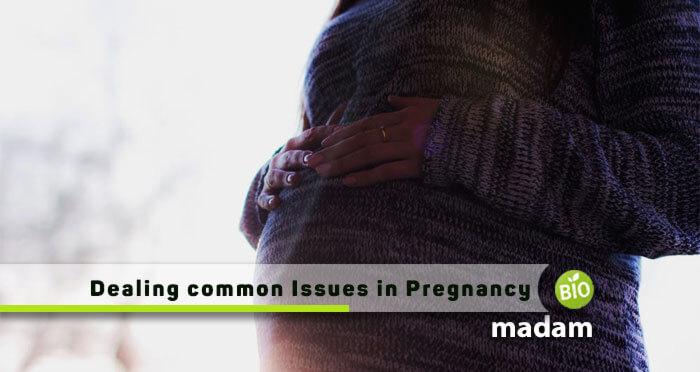There are several changes that occur on a pregnant woman during this time which include physical, emotional, and psychological. The majority of these side effects will disappear once after birth, but some can remain for a while or experience the side effects again. If you are pregnant, here are some of the common side effects you can expect and how to deal with them.
Indigestion
Pregnant women commonly experience indigestion due to high levels of hormones. The hormone relaxes the stomach muscles, which cause you to bloat easily and make digestion difficult. Pregnant women should avoid eating too much, eat small meals throughout the day, wear loose clothes to allow for better digestion, don’t consume carbonated beverages, or drink heavy liquids like coffee. Herbal teas that are safe include ginger tea or peppermint tea, which can help with indigestion relief. It would be beneficial for pregnant women to take probiotics as well because it helps ease digestive problems by increasing good bacteria in your gut.
Instead of taking antacids, try fixing foods that fix an upset stomach such as toast, dry crackers, or bananas. If you were wondering about certain medications like taking gaviscon and omeprazole at the same time, this is a safe way to relieve heartburn. Still, you should never take any medication without talking to your doctor first! In conclusion, the majority of indigestion issues in pregnant women will go away once after birth, but there are certain foods and beverages you should avoid.
Urinary Tract Infections
A common pregnancy side effect that can be uncomfortable is a urinary tract infection (UTI). A UTI occurs when bacteria are present in the urinary tract, which is also known as a bladder infection. A UTI can be easily treated at home with antibiotics, but if left untreated it could lead to kidney failure, so it is important to seek immediate medical attention. To prevent UTIs, you should drink lots of water and cranberry juice because these are known to treat urinary infections.
You should also wipe from front to back after going to the washroom instead of wiping backward because this will help with preventing bacteria from entering your urethra. It is likely that pregnant women with low immune systems are more susceptible to getting a UTI due to hormonal changes or an increase in pressure around the bladder, which makes it hard for them to empty their bladders completely. While UTIs are common during pregnancy, you should still contact your doctor if you experience signs and symptoms of a UTI because these may not go away with home remedies.

Back Pain
Back pain is another common pregnancy side effect that should not be overlooked. This pain is typically felt between the ribs and pelvic area, which can feel like a dull ache or sharp pinching sensation. There are several reasons as to why pregnant women experience back pain such as carrying extra weight, poor posture from leaning forward for support, and hormone changes. For most cases of pregnancy-related back pain, you will usually recover after giving birth, but if your back pain becomes severe or lasts longer than a few days, then it would be a good idea to consult with a doctor.
Back exercises may help relieve some discomfort during pregnancy by improving posture and reducing tension on the lower spine. These include keeping your knees slightly bent when you stand up from a sitting position, so you don’t put all of your body weight on your spine. You should also keep a pillow nearby when you sleep at night to hug it or place it under your back for support.
Hair Loss
One of the most common pregnancy side effects is that pregnant women may experience spontaneous hair loss after they become pregnant. This is because, during pregnancy, your body produces more estrogen, which causes your hair follicles to be smaller and make it harder for the hairs to stick out from the scalp. The average amount of shedding per day is 50-100 strands, which means you will notice a slight thinning by the end of the third month.
Also, if you have darker hair then expect to see lighter strands come through as well since there are mixed pigments in your new hairs. It would be beneficial for those experiencing hair loss during pregnancy to introduce vitamin supplementation into their diet such as Vitamin B12 or iron since these can contribute to hair loss as well. Also, avoid styles that pull on your hair such as extensions or tight braids as this will only worsen the problem. In some cases of severe hair loss, women experience balding around their temples and receding hairlines, but this usually occurs after birth.
Dry Skin/Itchiness
Another common pregnancy side effect that women experience is dry skin. Pregnant women should be aware that their body’s natural oil production will change during pregnancy, which can lead to dry and itchy patches of skin. Also, during warmer seasons, the air tends to be drier, which can make you feel even itchier. For those who have a hard time dealing with dry skin or severe itching, there are a few home remedies that may help. One way to keep your skin moisturized is by applying coconut oil to the affected areas as well as drinking more water throughout the day since this helps flush out toxins from your system.
Another way to relieve itching is by taking cold showers since this causes your pores to tighten and makes it much harder for the skin to produce oils. It would be best to avoid taking long hot showers since this will open up your pores and cause more oil production. Also, make sure you are eating the proper diet and getting the daily recommended dosage of water. Lastly, make sure you are washing your clothes properly with no fragrance softeners to avoid irritation from certain fabrics.

Although pregnancy comes with its own share of side effects, learning how to deal with the various symptoms will make your pregnancy experiences much easier. It’s important to remember that everything will be okay since most women who experience these side effects go back to normal after giving birth. However, if any of your symptoms are severe or last longer than a few days, then it would be a good idea to consult with a doctor.

Hi, they call me Jenna, and I am also known for achieving a gold medal during my Ph.D. in science life. I always had a dream to educate people through my utmost writing hobby. So, I chose this blogging path, and Biomadam gave me this opportunity to present for them. I now stand to entertain you. Continue reading my articles & discuss if you’ve any confusion through the comment section below.

